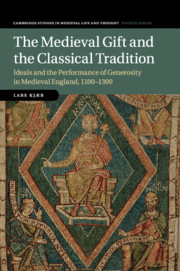 The Medieval Gift and the Classical Tradition
The Medieval Gift and the Classical Tradition Book contents
- The Medieval Gift and the Classical Tradition
- Cambridge Studies in Medieval Life and Thought Fourth Series
- The Medieval Gift and the Classical Tradition
- Copyright page
- Contents
- Acknowledgements
- Abbreviations
- Chapter 1 Introduction
- Chapter 2 The Gift in Classical Literature
- Chapter 3 De Beneficiis in Medieval Contexts
- Chapter 4 Writing Generosity
- Chapter 5 Sanctifying Generosity
- Chapter 6 Romancing Generosity
- Chapter 7 Performing Generosity
- Conclusion
- Bibliography
- Index
Chapter 3 - De Beneficiis in Medieval Contexts
Published online by Cambridge University Press: 10 August 2019
- The Medieval Gift and the Classical Tradition
- Cambridge Studies in Medieval Life and Thought Fourth Series
- The Medieval Gift and the Classical Tradition
- Copyright page
- Contents
- Acknowledgements
- Abbreviations
- Chapter 1 Introduction
- Chapter 2 The Gift in Classical Literature
- Chapter 3 De Beneficiis in Medieval Contexts
- Chapter 4 Writing Generosity
- Chapter 5 Sanctifying Generosity
- Chapter 6 Romancing Generosity
- Chapter 7 Performing Generosity
- Conclusion
- Bibliography
- Index
Summary
Chapter 3 focuses on Seneca’s De beneficiis, one of the most extensive and influential classical texts dealing with the idea of generosity. The chapter explores how this text was received in the twelfth and thirteenth centuries, focusing on the manuscripts surviving from medieval England. The first part of the chapter explores what the surviving manuscripts can tell us about the reception of Seneca’s work, looking at the manuscript context, the way in which it was abbreviated and adapted and the marginal comments left behind by medieval readers. The second part of the chapter explores the way in which Seneca’s work was utilised in florilegia, collections of classical sayings. It concludes that the abbreviated manuscripts and the florilegia both indicate that over the twelfth and thirteenth centuries, Seneca’s work became increasingly widely available.
- Type
- Chapter
- Information
- The Medieval Gift and the Classical TraditionIdeals and the Performance of Generosity in Medieval England, 1100–1300, pp. 42 - 65Publisher: Cambridge University PressPrint publication year: 2019
